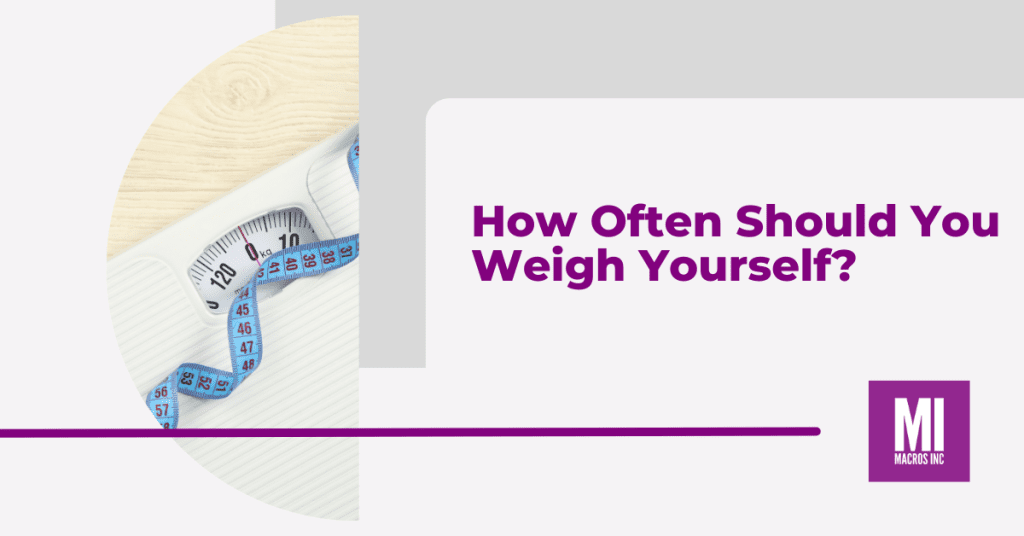By: Tom Franclemont | Macros Inc. Coach
How frequently do you jump on the scale? Daily, weekly, maybe only monthly? Or perhaps you think it’s best to ditch the scale altogether. Before you do that, let’s discuss what the scale does and how to make it a useful tool for reaching your goals.
Jump to a Topic
Hop to a Topic
Understanding Scale Weight
Weight vs. Mass
It’s important to remember that a scale is an instrument for measuring weight, not mass. What is the difference? Gravity! Your body contains a certain amount of mass, and that mass would be unchanged whether you were measuring it here on Earth, on the moon, or on another planet. However, the scale is measuring your weight, which is the relative heaviness of that mass with the forces of gravity acting upon it.
The Key Influences on Scale Weight
Ok, why the lecture on mass versus weight? Well, many people are interested in weight loss, but since decreasing weight requires either reducing gravity or reducing mass, we actually are seeking to lose mass. Not all of the mass in our body is mass that we want to lose though. Your body mass includes a combination of your organs, bones, muscle tissue, fat tissue, the contents of your digestive tract, bodily fluids, and more. All of these are represented by the number you see on the scale.
Impact of Water Weight
One of the components that has the largest impact on the scale is water weight. Have you ever lifted up a gallon of water? It isn’t light. For our friends using the metric system, it’s an easy calculation. One gallon of water is equivalent to 3.785 liters, and for water, 1 liter of volume weighs 1 kilogram, so 3.785L = 3.785 kg. Putting that into imperial measurements, 1 gallon of water weighs approximately 8.3 lbs.
Why does that matter so much? Water composes about 60-65% of an adult male’s body weight and about 50-55% for an adult female (1). When you realize that a 200 lb adult male has roughly 14-15 gallons of water in his cells and tissues at any given time, then you can see why water weight is such a big deal.
That water in your body can fluctuate a great deal based on a number of factors, such as hydration levels, sodium intake, carbohydrate intake, and hormones just to name a few. While the amount of fat mass or muscle mass that can be lost or gained in a 24 hour period is very small, the amount of water in your body can change significantly from day-to-day. With more than half of your weight coming from water, that change is going to be very noticeable on the scale.

How Often Should You Weigh Yourself?
Considering that fluctuations in body water have such a huge impact on the scale from day to day, you might be thinking now that weighing yourself frequently is pointless. But in reality, the more points the better.
The best way to get useful information about your body mass is to consistently collect data to look for patterns and an overall trend in the desired direction. Consider weighing yourself at the same time each day, such as in the morning after using the bathroom to create a baseline for accurate and reliable measurements.
Keeping Track Keeps You on Track
Not only does weighing yourself frequently provide more reliable information about changes in your body mass, but it also improves adherence to a caloric deficit and produces greater fat loss results compared to less frequent weighing (2). Frequent monitoring of progress increases your awareness of how your choices are determining your results.
But, that also doesn’t mean that hopping on the scale should be the only method you use to check your progress. On the contrary, the scale should be one of many tools that are utilized. Other methods include tracking body measurements, taking photos, being aware of changes in the fit of your clothes, and most importantly, what the mirror shows you.
The scale happens to be the method that gives us the most immediate feedback though, so while your ultimate goal should be focused on what the mirror shows rather than the number that the scale says, the data that we can collect from the scale is a key piece of getting those results.

Where Can I Weigh Myself For Free?
Now that we’ve discussed the significance of weighing yourself and how it can provide valuable insights into your body mass trends, you might be wondering where you can find a scale for regular measurements without shelling out any money. Fortunately, there are several options available that allow you to weigh yourself for free.
- Gyms and Fitness Centers: If you’re a member of a gym or fitness center, you’ll likely find scales in the locker rooms or other common areas. Gyms often provide scales as part of their facilities to encourage members to track their progress. Just make sure to use the same scale each time for consistency.
- Local Community Centers: Many community centers, recreation facilities, and public spaces have scales available for use. These places might offer free access to scales as part of their wellness initiatives. Check with your local community center or similar establishments to see if they provide this service.
- Pharmacies and Drugstores: Some pharmacies and drugstores have scales available for customers to use. These are usually located in a discrete corner of the store. Although the main purpose is to promote health and well-being, keep in mind that these scales might be less private than those found in your own home.
- Health Clinics: Certain health clinics and medical offices have scales in their waiting areas. If you have a scheduled appointment or if you’re visiting for any reason, you might be able to take a moment to weigh yourself.
- Wellness Events: Occasionally, community wellness events or health fairs might offer free health screenings, including weight measurements. Keep an eye out for such events in your area.
- Friends or Family: If you have friends or family members who own scales, you could ask to use theirs occasionally for weigh-ins. Just be sure to maintain consistency by using the same scale every time.
Finding the Right Balance
So, how often should you weigh yourself? The answer lies in finding the right balance. Weighing yourself daily, especially in a consistent routine, provides valuable data points and allows you to observe patterns and trends in your body mass. It helps you understand how your choices impact your weight and allows for adjustments to your approach.
Try our nutrition coaching, for free!
Be the next success story. Over 30,000 have trusted Macros Inc to transform their health.
Simply fill out the form below to start your 14-day risk-free journey. Let's achieve your goals together!


